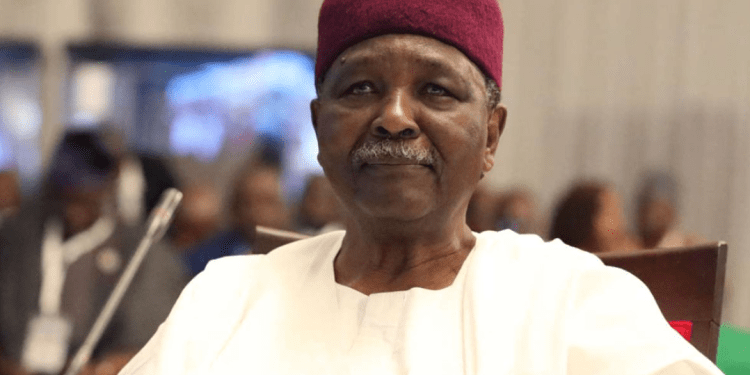Yakubu Gowon, a former head of state and founding father of the Economic Community of West African States (ECOWAS), has lauded President Bola Tinubu for uniting the bloc under his leadership.
Mr Gowon made this known at the inauguration of the Academy of International Affairs (AIA), a foreign policy think-thank founded by former foreign affairs minister, Prof. Bolaji Akinyemi, on Monday in Abuja.
He said the inauguration of AIA with Mr Tinubu as ECOWAS chairman, and who recently achieved a foreign policy milestone by making efforts to forestall its disintegration, was highly commendable.
Mr Gowon said that the event resonated with him, and was reminiscent of when he laid the foundation for the establishment of ECOWAS on May 27, 1975, alongside 14 other West African leaders.
“I must commend President Bola Tinubu for all the foreign policy initiatives he made, which have kept ECOWAS together in the face of recent challenges.
“I implore the President to continue to ensure that Nigeria’s voice remains audible and its influence felt in international relations,” he said.
Mr Gowon, who was the chairman of the occasion, also lauded the president of AIA, Mr Akinyemi for his tireless efforts towards birthing the academy.
“I have closely followed Prof. Akinyemi’s international relations career over the years. His intellectual prowess is unmatched, he is resolute and undaunted in whatever he does,” he said.
Mr Gowon, who also conferred an honorary fellow of the academy on Afreximbank president, Prof. Benedict Oramah and other distinguished fellows, said the event was a recognition of deserved persons.
Speaking, minister of foreign affairs, Amb. Yusuf Tuggar, commended Mr Akinyemi for his vision, efforts and dedication towards ensuring that Nigeria’s foreign policy was constantly put on the front burner through various intellectual activities.
While appreciating the AIA group, Mr Tuggar said their long-standing cooperation with the ministry was desirable, stressing that the academy had the potential to improve the management of Nigeria’s foreign policy.
“It is even more remarkable that the inspiration and impetus behind the formation of this Academy was entirely the initiative of distinguished foreign service officers who have paid their dues to our country many times over.
“History will record this day as a key bookmark in the place of our elite in keeping the faith that our country can continue to rely on them to place before it their entire assets in patriotism, skills and competences.
“You have vindicated a widely-acknowledged truism that nations which know what was best for them trusted the conduct of their foreign policy only to its best and the brightest,” he said.
According to Mr Tuggar, Nigeria’s core foreign policy thrust is Afro-centric, driven through a three concentric circle application, aimed at achieving economic growth, peace and security within West Africa and Africa at large.
“I see this event as auspicious and coming at no better time than when President Bola Tinubu’s newly defined foreign policy projection as captured under the 4Ds namely Democracy, Development, Demography, and Diaspora is being anchored.
“The 4Ds doctrine is being deployed to build alliances through diplomatic engagement and partnership with other nations, multilateral institutions and the Diaspora community.
“President Tinubu’s foreign policy outlook heralds a new era of regional stability and collective prosperity for the sub-region and indeed Nigeria. Through these efforts, Nigeria can assume a stronger leadership role in resolving conflicts and driving economic growth across Africa.
“Understanding the interconnectedness of our nation with the African continent, Mr. President emphasises the significance of engaging with regional organisations, such as the African Union (AU), the Economic Community of West African States (ECOWAS) and forging strong partnerships with international allies,” he said.
Mr Oramah, in a keynote speech, said the AIA platform would be a crucible for insightful policy making in Nigeria and, indeed Africa, at large.
Speaking on the subject: “The AfCFTA, Natural Resources and Development Capital Formation in Africa,” Oramah noted that AIA comprised of some of the best minds, hence its policy outputs would be priceless.
According to him, any nation desirous of development must assess its endowments of its resources and find that combination of labour and capital that will yield the most optimal economic growth outcome.
Africa, he said, had always been characterised by abundant supply of labour and severe scarcity of capital, hence the marginal cost of labour has been quite low while the marginal cost of capital had historically been prohibitively high.
He said that instead of promoting and implementing policies that considered labour as Africa’s greatest resource, its leaders had erroneously considered their natural resources as their greatest resources.
“This mis-identification of our resource endowment has several consequences: First, it deprioritises human capital development, which is why we have an army of unemployed and functionally unemployable people.
“Once we accept that labour is our most abundant resource and that capital is the binding constraint to our development, it follows therefore that countries endowed with mineral resources must understand that those resources are a source of capital and that they are therefore useless while under the ground!
“The goal should be to extract them as quickly as possible through various means including stringent production; obligations on mining concession holders; pledging them for loans; and selling them forward for cash,” he said.
The Afreximbank boss said that African leaders must pay attention to policies that would help convert the continent’s abundant labour supply into capital, adding that their industrial policies must take this into consideration.
Mr Oramah also said that financing was key to supporting intra-African trade especially under AfCTA, adding that Afreximbank pioneered intra-regional trade financing of over 30 billion U.S. dollars in the past eight years.
“We will not be able, as a continent, to build the reservoir of capital required to fund our development unless we support our multilateral financial institutions.
“It is critical that these institutions have the full weight of AU member states behind them and the appropriate capital to continue serving Africa’s development,” Mr Oramah added.
(NAN)






